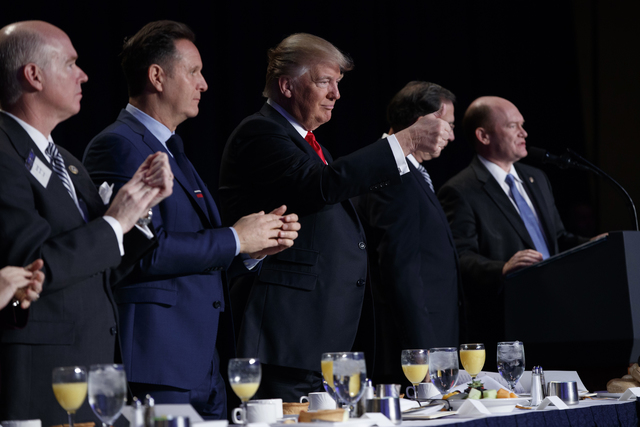Don’t let Donald Trump tear down the wall between church and state: that’s a wall we should keep
It’s beyond ironic that clergymen are so terribly eager to erase a provision of the tax law that could end up hurting their churches.
After Donald Trump finished extolling his ratings on “The Apprentice,” he told the National Prayer Breakfast last week that it was his intention to erase the Johnson Amendment. That rule prohibits non-profits, including churches, from endorsing political candidates. In exchange, those groups are exempt from taxes.
“Freedom of religion is a sacred right, but it is also under threat all around us,” Trump told the group. “That is why I will get rid of and totally destroy the Johnson Amendment and allow our representatives of faith to speak freely and without fear of retribution.”
First, people of faith are freer in America than anywhere else in the world. Attending non-sanctioned churches in China can get you tossed into jail. And evangelism in certain Muslim nations may put you in mortal peril.
But second, the rule makes sense. If pastors truly believe endorsing a political candidate from the pulpit is a matter of absolute conscience, they’re free to do so. But if they do, they’ve become like any other PAC, and shouldn’t be free of taxation.
Besides, that’s not what churches are for. Consider the final words of the risen Christ to his disciples: “Therefore, go and make disciples of all nations, baptizing them in the name of the Father, and of the Son and of the Holy Spirit, teaching them to obey everything I have commanded you.”
There’s nothing in there about endorsing candidates for office. In fact, you’ll search the Gospels in vain for Jesus’ exhortations to political activism.
Many modern believers forget that truth, and tempt fate.
“Pastors should be held accountable to God alone for what they say behind the pulpit, not the IRS,” said Tony Perkins, president of the Family Research Council Action. (That group, by the way, is allowed to make endorsements, and Perkins did, despite questions about Trump’s own Christian example. The operative factor, as it was for so many, was apparently the fact that Trump was not Hillary Clinton.)
But Perkins should be careful what he wishes for. And so should Trump, for that matter.
Conservative evangelicals usually find themselves aligned with Republican politics because of social issues. They cite biblical passages condemning homosexual activity and abortion.
But even a casual reader of the Bible could not fail to miss other parts of scripture that presumably are of equal import. Leviticus 19:34 commands “the foreigner residing among you must be treated as your native-born. Love them as yourself, for you were foreigners in Egypt.” Deuteronomy 15:11 reminds, “There will always be poor people in the land. Therefore, I command you to be openhanded toward your brothers and toward the poor and needy in your land.” And Jesus — who saved his strongest condemnation for greedy exploiters of the people and religious hypocrisy, said in Mark 10:25 that “it is easier for a camel to go through a needle than someone who is rich to enter the kingdom of God.”
In fact, the one time a pastor did speak out, Trump didn’t take it very well. Pope Francis said last year that, “A person who thinks only about building walls, wherever they may be, and not building bridges, is not Christian. That is not the Gospel.” Trump called the comment “disgraceful,” and said “no leader, especially a religious leader, should have the right to question another man’s religion or faith.” Not even the pope!
Very well, then. Let pastors be about the business of saving souls, and politicians be about the business of running the government. And if we’re to build a wall, let it be between the two.
Steve Sebelius is a Review-Journal political columnist. Follow him on Twitter (@SteveSebelius) or reach him at 702-387-5276 or SSebelius@reviewjournal.com.







